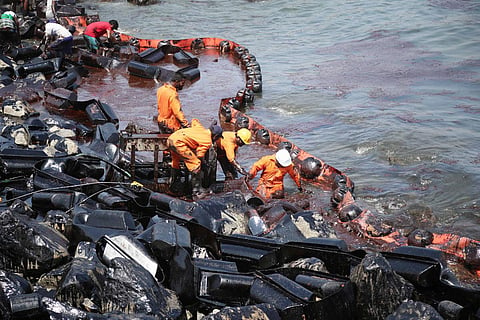

CHENNAI: Although there have been three oil spills in the last six years, Tamil Nadu still does not have an approved state oil spill disaster contingency plan (SOS-DCP), which is a detailed oil spill response and removal plan that addresses controlling, containing and recovering an oil discharge that may be harmful to navigable waters or adjoining shorelines.
While the oil companies and district authorities are holding remediation work on Nagapattinam coast, the final draft SOS-DCP submitted by the state government is gathering dust at the Delhi office of Indian Coast Guard waiting for approval since four years.
In Nagapattinam, an undersea crude oil pipeline of CPCL ruptured on March 2 leaking hundreds of litres of crude oil into the sea. A CPCL spokesperson said the leak was arrested on Saturday early morning and currently remediation work was on.
After the Ennore oil spill in 2017, when two cargo vessels collided two nautical miles off Kamarajar Port, resulting in oil spill that polluted 35km along Chennai coastline, a draft SOS-DCP was prepared by an expert committee appointed by the state government. It was led by BR Subramanian, former advisor to the ministry of earth sciences (MoES) and senior scientific consultant to National Centre for Sustainable Coastal Management (NCSCM).
Sources told TNIE that the draft was circulated internally, some revisions made and the final version was submitted to the Indian Coast Guard for approval by the end of 2017. Another oil spill occurred in 2018 when two tonnes of furnace fuel oil spilled when a flexible hose snapped while discharging the oil at the marine liquid terminal at Kamarajar Port.
All coastal states are mandated to prepare a contingency plan under the National Disaster Management Act (2005) and the United Nations Convention on the Law of the Sea (UNCLOS) and are obligated to protect and preserve marine life. It has to be consistent with the national oil spill disaster contingency plan (NOS-DCP).
“It was taken up with Indian Coast Guard director general VS Pathania at the 24th National Oil Spill Disaster Contingency Plan and Preparedness Meeting in Chennai. We have not received any response so far,” TN department of environment and climate change director Deepak S Bilgi told TNIE. Indian Coast Guard officials were unavailable for comments.